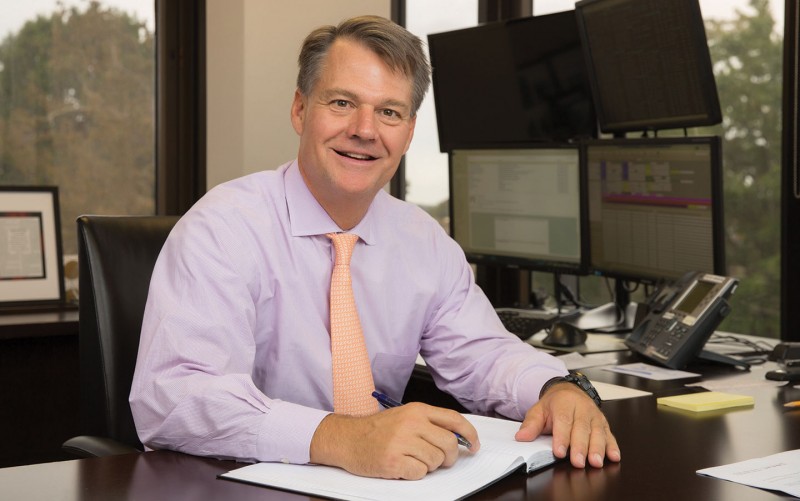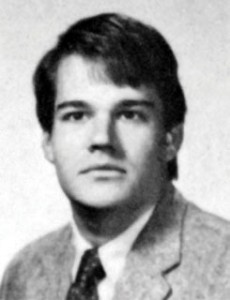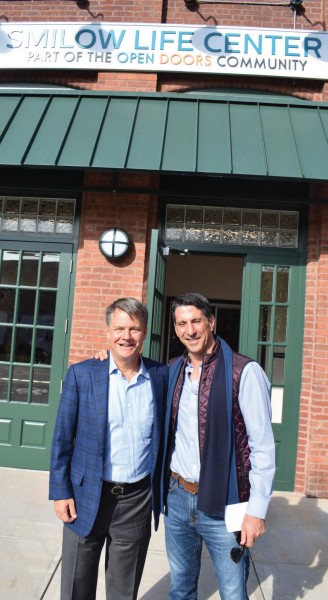The $8.4 Billion Dollar Man

What Makes the Top Money Manager in America Tick
By Joe Meyer
Jeff Erdmann ’85 navigates the rarified air of wealth management for millionaires and billionaires just like he played lacrosse at Ohio Wesleyan – with a plan, with a focus on succeeding, and with determination that no one will top his work ethic.
It’s working.
 Forbes magazine for two consecutive years has ranked Erdmann as the No. 1 wealth advisor in the United States. Erdmann runs his own elite private wealth management team from a wing of Merrill Lynch’s Greenwich office, on southern Connecticut’s Gold Coast, where hedge-fund managers and high-finance pros help make the region among the most affluent in America. His 29 staff members handle the accounts of 170 “ultra-high net worth” families, with combined assets of $8.4 billion. Ninety percent of the heads of those families are CEOs, presidents, or founders of highly successful private or public businesses.
Forbes magazine for two consecutive years has ranked Erdmann as the No. 1 wealth advisor in the United States. Erdmann runs his own elite private wealth management team from a wing of Merrill Lynch’s Greenwich office, on southern Connecticut’s Gold Coast, where hedge-fund managers and high-finance pros help make the region among the most affluent in America. His 29 staff members handle the accounts of 170 “ultra-high net worth” families, with combined assets of $8.4 billion. Ninety percent of the heads of those families are CEOs, presidents, or founders of highly successful private or public businesses.
Recognition as the best of the best in this highly competitive world doesn’t surprise those who know Erdmann. Personable and affable, he’s a born salesman, down to earth yet devoting his focused attention to the task at hand – whether it’s growing a client’s fortune or volunteering at a homeless shelter.
Erdmann says many experiences from his days at OWU shaped his foundation and philosophy: playing lacrosse for Coach Jay Martin; taking part in the “London Program” his junior year as an economics major to study in the English capital and visit Europe; and of course, his senior-year internship with Merrill Lynch in Philadelphia. He returned to campus from Philly to finish his remaining classes and senior season on the lacrosse team, but he’s been with Merrill Lynch ever since, rising in 33 years from stock broker to wealth manager.
He often thinks back to the first day he walked into Psychology 101 at OWU. The self-described “knucklehead freshman just thinking about girls and having fun” was struck by a head-scratcher the prof had written on the blackboard: “Giving is a selfish act.”
“It makes you feel good when you give,” Erdmann says of probably the first lesson to sink in with him at OWU, “so you can argue that it’s a selfish act.” Now 55, Erdmann says his philosophy on giving has ripened along the lines of the old saw he learned from Dollar Tree founder Macon Brock: “Money is like manure – only good if you spread it around.”
Go-To ‘FOGO’ Guy on Lacrosse Field

Erdmann grew up in New Canaan, Connecticut, not far from his Greenwich office and home in nearby Norwalk. He attended the private New Canaan Country School and the Salisbury School, an allboys boarding high school in northwest Connecticut.
He came to Ohio Wesleyan in no small part to play lacrosse for Coach Jay Martin. Martin may be better known for his national records set coaching the Battling Bishops’ men’s soccer teams, but as a collegiate athlete himself, Martin was an All-American lacrosse player and also coached OWU’s men’s lacrosse teams for eight years. He won four Midwest Lacrosse Association titles, made the NCAA playoffs six times, and twice was named MLA Coach of the Year.
In the early 1980s, a scrappy New England kid known as “Erdy” struggled to persuade the skeptical coach to put him on the field as the team’s face-off specialist. “He was our FOGO guy,” says Kevin Waldron ’88 – Face-Off and Get Off the field, to be replaced by a midfielder. Waldron was a freshman when Erdmann was a senior and only met him upon his return from the Merrill Lynch internship. At practices that fall, he didn’t expect to be impressed.
“I’m from Long Island,” Waldron says. “I’m thinking, ‘Oh Jesus, this kid from New Canaan and boarding school?’ … But he would break your arms to get that ground ball.” In a sport where possession is paramount, the FOGO guy plays a critical role. “He was an incredibly scrappy guy. Hard-nosed. I wasn’t expecting the toughness out of a kid from New Canaan.”
Jeff has just always had this belief, you can accomplish anything if you focus, set goals, have determination.
Bill Taylor ’85 was Erdmann’s classmate for four years and Sigma Alpha Epsilon brother. Also from New Canaan, his memories of Erdmann’s toughness actually range back to grade school. “I went to West Elementary, the public school, and Jeff went to the Country School, the private school in New Canaan. The football teams would play once a year,” Taylor says. Laughing at the memory of playing with their names taped across the front of their helmets, he met Erdmann in a few collisions that he didn’t enjoy. “I remember trying to tackle him. He played fullback and I was a linebacker, and he would just run guys over.” After a few encounters, “I didn’t want to have anything to do with taking on that Erdmann kid,” he says.
At OWU, Erdmann didn’t bowl over the coach at first. But challenged by that, he set his sights on earning his way onto the field. “Jeff has just always had this belief, you can accomplish anything if you focus, set goals, have determination,” Taylor says.
Erdmann has stayed close with Taylor and Waldron and gets together with them regularly. They make sure to attend the OWU Holiday Party in New York City each year. Waldron’s son and one of Erdmann’s sons roomed together in high school and both captained their football and lacrosse teams. Their wives are close friends.
Both former OWU classmates are proud of their friend’s high achievement. Neither is surprised.
In college, Taylor says, Erdmann wasn’t a straight-A student but unlike most their classmates, he knew exactly what he wanted to do. “Jeff was always headed to Wall Street, was always going to be an innovator,” Taylor says.
“He’s a great mentor to so many thousands of finance guys” these days, lecturing at universities and speaking at seminars across the country. His story is “about your determination and your goals and going at it every day.” And it was about that back in the ’80s at Ohio Wesleyan.

Family First, Second, and Third
Erdmann likes to say he’s blessed with three families. First, there’s his actual family: Barbara, his wife of 25 years, and their three sons, ages 23, 21, and 13 ; his parents, and his brothers. Barbara is an accomplished photographer with a growing offering of large-scale, fine art photography. (Check out her work at barbaraerdmannphotography.com.) She donates all proceeds from sales to charity.
He calls his team at the Erdmann Group his second family. Assembled over his career at Merrill Lynch, the Erdmann Group team now has a roster of 29 players. “No one works for us. We all work for the clients,” he says. And he adds, “No one in 33 years has volunteered to leave my team.”
Honesty is key. Because guess what: People do business with people they like and trust.
He says he’s worked to create a family atmosphere at the business, with everyone focused on serving his third family, the Erdmann Group clients, a roster that includes Scarsdale, New York, custom builder Ron Parlato. Black Monday in 1987 cost Parlato, by his estimate, two-thirds of his first fortune, built in the mechanicals business. But he counts it as maybe “the best thing that ever happened to me,” because through it, he became the client of a young upand- coming money manager, Jeff Erdmann.
Now a client for more than 25 years, Parlato counts Erdmann as a friend and considers his character and financial skills the best he’s ever encountered in decades of dealing with high-finance money handlers. Parlato extols Erdmann’s “360-degree business model,” which starts with creating a custom coreholdings plan for each client, followed by constant monitoring of the mix of stocks, bonds, and alternative investments – including regular check-ins from the Erdmann Group members to assess his comfort level. “Ninety-six to 97 percent of the time, I go with them,” he says, acknowledging the inevitable roller-coaster ride of the financial markets.
Parlato has learned to trust Erdmann. From 1992 to 1997, Parlato was heavy into dot-com investing as the bubble built, but Erdmann gradually maneuvered his core portfolio out of those allocations, granting Parlato a side pool of money to play with.
Then the dot-com bubble burst in 2001. Parlato’s “side money” was gone, but thanks to Erdmann, his core was undamaged. “He never said anything. He never said, ‘I told you so.’” But after the NASDAQ tumble, “He had a grin on his face like Warren Buffett gets,” as he planned to “go and pick off stocks at 50-percent value.”
More Than a Money Manager
Erdmann is a pioneer in what Forbes calls “Freud Meets Finance.” Today’s top money managers are helping clients think beyond their balance sheets, to what they actually want out of life. Money managers want to be involved in investments, and also when a family crisis strikes. They want to grow their client’s wealth, and help plan how they spend it and give it away. “Our business has a tagline: the Ultimate Client Experience,” Erdmann says. “The outcome is the families are happy. Referrals build. … It’s all about focus on the client and what matters most in their lives.”

Hired by Merrill Lynch as a broker after graduation from OWU in 1985, and assigned to the same Philadelphia office where he interned, Erdmann saw a different scale of need for wealthy clients very early in his career. “Five or six years into it, I went to the chairman and said, ‘Hey boss, none of our clients want or need a stock broker,’” Erdmann says. “What wealthy and successful families need and want is a team of professionals who can help them plan and manage all aspects of their planning and finances.” Eventually, Merrill Lynch allowed him to establish the Erdmann Group within the private banking division of the global financial services giant.
Erdmann says he spends a third of each day talking with clients about things that have little to do with their investments. He wants to know about events going on in their lives that are important to them, regardless of whether finances are directly involved.
“I want to get that call if, God forbid, there’s a tragedy, if someone is considering selling their business, if there’s problem with a child” or some personal issue that’s not finance-related.
“Honesty is key. Because guess what: People do business with people they like and trust.”
Following His Own Advice
These days, Erdmann thinks almost as much about how to give money away as he does how to make it. He counsels clients to treat philanthropy as part of their portfolios, suggests they find causes they are passionate about, and work to put their financial support of them to substantive, effective use. For Erdmann, this means turning a couple of miles from his Norwalk home to a pocket of urban blight surrounding the Norwalk Open Door Shelter. He has served on the shelter board for many years and recently co-chaired a major capital campaign. “Look, I live in a very nice house, on the water.” But two miles away, he notes, people are struggling in poverty.
Jeannette Archer-Simons, executive director of Open Door, says the organization is fortunate to have Erdmann involved. Her initial fundraising campaign goal was $8 million. The board told her to expect maybe $3 million. With Erdmann and the other co-chair’s leadership, the campaign exceeded all expectations and raised $10 million, including $4 million in government grants and significant contributions from a local hospital.
The money is funding creation of the Smilow SoNo Life Center. Converted from a dilapidated empty warehouse a half-block from the shelter, the center will have 14 supportive housing apartment units, two respite hospital beds for people leaving the hospital, a health clinic to provide basic health services as well as mental health and drug/alcohol dependency treatment, classrooms for jobs training, and a computer lab. Various community partnerships will allow for additional services and skills training to support independent living. Next, the shelter will focus on expanding its services with acquisitions in the surrounding neighborhood.
 “Jeff has a real vision for creating affordable housing, for addressing issues that make (shelter residents) homeless,” Archer-Simons says. “He’s just committed to us being excellent at what we do … (and) to make sure we’re helping people move forward.”
“Jeff has a real vision for creating affordable housing, for addressing issues that make (shelter residents) homeless,” Archer-Simons says. “He’s just committed to us being excellent at what we do … (and) to make sure we’re helping people move forward.”
Erdmann says he’s inspired by the shelter. The plan for self-sustainment being put in place, he hopes, can be a model across the country. He loves popping in with his family members, and the fact that his 13-year-old, whose dad is responsible for billions of dollars each day, feels at home in the neighborhood. “I’m very proud of it,” he says. “It makes me tick.”
Joe Meyer is a freelancer writer from Westerville, Ohio.
